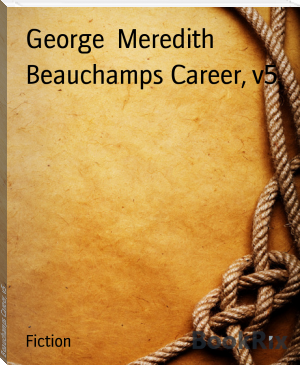Blacksheep! Blacksheep! - Meredith Nicholson (freenovel24 .txt) 📗

- Author: Meredith Nicholson
- Performer: -
Book online «Blacksheep! Blacksheep! - Meredith Nicholson (freenovel24 .txt) 📗». Author Meredith Nicholson
"He says the girls' camp is on his land and he's only trying to drive 'em off," replied Briggs. "Whatever his game is it's none of my business."
"It's any man's business to protect women and innocent children from the malice of a madman. To let you into a dark secret, he's got the idea that there's buried treasure somewhere on the land occupied by Heart o' Dreams Camp."
"Treasure!" exclaimed Eliphalet. "Do you mean to say there's money buried there?"
"That's the idea," said the Governor with a grim smile at the sudden glint of greed in the old man's eyes. He told the story, told it with flourishes and decorations that pleased Archie immensely.
"It sounds pretty fishy," Briggs remarked, "but there may be something in it."
"You never can tell," muttered Eliphalet. "It would have been natural for one of those old southerners who hadn't any confidence in Jeff Davis to plant his money in some lonely place like this."
"In one way or another we are all seekers of buried treasure," remarked the Governor sententiously.
His story had cleared the air, giving, as Archie reflected, a fresh illustration of the power of romance to soften the harshness of even so realistic a situation as confronted the tug's passengers. Eliphalet's imagination had been stirred, and he asked many questions about the treasure. Briggs lost his hostile air and showed himself the possessor of an unsuspected amiability.
"You seem to be a good fellow," remarked the Governor; "and your interest in the Arthur B. Grover is legitimate enough, I daresay. If you will promise to behave and not try to leave the tug or molest any one on board you're free to do as you like. But I want you to play fair."
"I seem to be at your mercy. You've got to consider that my reputation is at stake. It's my duty to land Mr. Congdon and that chap you call Perky in the nearest jail and report their arrest to Washington."
"Washington," replied the Governor, drawing his hand across his face, "is a beautiful city; but it's a long way from here. Be assured that I'm no anarchist and the delicate matter of your professional standing is something that shall engage my most earnest thought. Please make yourself comfortable."
He bade Archie follow him to the bow where Eliphalet was moodily gazing into the water.
"Mr. Congdon," the Governor began in his blandest tones, "as a mere looker-on at the passing show I'm persuaded that you're not getting much out of life. A mistake, sir; a mistake it grieves me to see you making."
"What I do or do not do," cried the old man, lifting his umbrella belligerently, "is none of your infernal business."
"An error, sir; an error of considerable magnitude, if you will pardon me! I wish my friend here to bear witness that I am qualified to offer you excellent advice based on exact information as to your intimate domestic affairs. You're a meddlesome person, Mr. Congdon, with a slight element of cruelty in your makeup, of which let us hope you are not wholly conscious. Morally you are skidding, but this I charitably attribute to your lack of a wholesome and healthy interest in life. Incidentally you've done all you could to destroy the happiness of your son, who is a fine fellow and a gentleman."
"And his wife, your daughter-in-law, is one of the noblest women in the world!" interjected Archie, seeing that the Governor's arraignment was not without its effect on the odd, crumpled little figure. However, the mention of Mrs. Congdon instantly aroused Eliphalet's ire.
"That woman ordered me out of her house—a house I bought and paid for! She did her best to make my son hate me! She compelled him to quit the businesses I started for the sole purpose of providing him employment!"
"Your trouble is that you never knew when Putney grew up," declared the Governor. "You tried to boss him even after his marriage, and if Mrs. Congdon turned you out of her house she did only what any self-respecting woman would do. As the result of your miserly ways, your meddlesomeness and your selfishness, you've just about ruined your life. The penitentiary yawns for you." Eliphalet shuddered, and a look of fear not pleasant to see crossed his face. "But," the Governor went on, "in spite of your cowardly conduct I'm rather disposed to pull you out of the hole."
"You will help; you really will help me?"
"Not if you cringe and whine like that. If you will stand square on your feet and listen to me I'll make you a proposition. Don't flinch; I don't want any of your money! I've heard that you make a habit of carrying your will around in that umbrella, for the ludicrous reason that you think you are not one of us absent-minded mortals who forget our umbrellas. And you like to have the will handy so you can rewrite it when the mood strikes you. Give me that thing!"
Eliphalet hesitated, but the Governor said, "If you please, Mr. Congdon," with all possible shadings of courteous insistence, and gently pried it from the old man's fingers.
It was a heavy, bulgy, disreputable-looking umbrella with a battered curved handle. The canopy was held together by a piece of twine. Rather than be seen with so monstrous a thing any self-respecting person would cheerfully take a drenching. The Governor opened it, shook out a number of manilla envelopes, all carefully sealed, and flung the umbrella from him as though it were an odious and hateful thing. As it struck the water it spread open and the wind seized it and bore it gaily away. The Governor watched it for a moment with an ironic grin, then began opening the envelopes and scanning the contents.
"I began life as a lawyer," he said coolly, "so you needn't fear that I'll not respect the sanctity of these experiments in the testamentary art."
Archie, taking and refolding the wills as the Governor finished reading them, marveled at this unexpected revelation of his friend's profession let fall in the most casual fashion, as was the Governor's way.
"It's evident from the dates of these wills that you've been steadily cutting down the amount of your bequest to your son," the Governor was saying, "so that if you died tonight he'd receive only a hundred thousand dollars, the remaining million or two going to humane societies, and one fat plum, I notice, to the Home for Outcast Cats. The eccentricities of testators have never impressed me by their humor, particularly when hatred and revenge are behind them. You would malevolently cut off your own blood merely because your daughter-in-law doesn't like your manners, which are bad, or because your son wouldn't fall in with your fantastic schemes of making money dishonestly. I suppose you've had a good time flourishing these wills before your son and his wife when you were peeved, to let them know how you planned to punish them. Watch me, Archie, so you can bear witness to the destruction of these things; they're all going to feed the fishes except this earliest one, which divides the property in generous lumps between Putney Congdon and his children, with a handsome personal recognition of Mrs. Congdon. That shall be preserved."
Eliphalet sullenly watched the Governor as he tore the papers into bits and flung them to the breeze, all save the one, which he again scanned with sophisticated care and stowed away carefully in his pocket.
"Now, sir; let us get down to business! If you will promise me never to make another will without consulting me, but will let this one I've kept stand, and if you agree not to interfere any further with your son's family or his wife or his children or his ox or his ass or anything that is his, for the rest of your natural life, I'll guarantee that in due season you'll leave this tug a free man."
"You can do that; you are sure you can save me?" Eliphalet's voice shook and his hands, thrust out appealingly, trembled pitifully as he turned from the Governor to Archie.
"My friend can do what he says," said Archie. "You may trust him."
"I promise," said the old man steadily. "But I must see Putney and explain about the coins. It was more in a spirit of playfulness, a curiosity to know how such things are done that I got mixed up in that business."
"I daresay it was and I'm sure you'll not repeat the offense," said the Governor, lighting a cigarette. "As to Putney, I'll arrange the meeting as soon as possible."
Eliphalet Congdon was the last man Archie would have expected to yield to the Governor's wizardry, or hypnotism, or whatever it was that caused people to submit to him; but the old man's face expressed infinite relief now that the Governor had so insolently assumed the rôle of dictator in his affairs. The pathos of the weazened little figure now stripped of its arrogance, and the assertion of a long-latent kindliness in his countenance, encouraged the hope that happier times were in store for all the Congdons.
The Governor and Archie were waiting on the Huddleston wharf when Putney and Leary returned from Calderville, bringing two sacks of Heart o' Dreams mail. Putney had loafed about the Calderville post-office and made purchases in several shops to learn if possible whether Carey's purpose in establishing himself in the woods was known to the villagers. He had, it seemed, represented himself as an investigator for a lumber company engaged in appraising timber. This was the story he had told in Calderville and the villagers had not questioned it.
"That's all right," said the Governor, "and serves our purpose well. Archie, you and Leary take the launch and carry the mail over to Heart o' Dreams. The tug will be within call in case you need help. At twelve o'clock meet me about a quarter of a mile this side of Carey's barricade; Leary's got the place spotted so he can find it in the dark. Use a canoe; no noise and no lights. Hurry along but don't blow up the launch."
"I have a surprise for you," said Ruth when Archie delivered the mail at the camp office. "I'm going to be busy sorting this mail, but if you will step to the door, bear left ten yards and stop by a bench under our tallest pine, some one you pretend to like rather particularly may appear, but just for a moment, remember! You ought to be eternally grateful to me for this; I had to overcome both the doctor and the nurse and the prejudices and suspicions of the particular person—"
"Isabel!" he exclaimed. He hadn't dreamed that he might see Isabel.
She came toward him out of the shadows, wrapped in a long cloak, carrying a lantern, and paused by the bench.
"These old-fashioned lanterns are a lot nicer than the electric flash things," she remarked.
They sat down with the lantern between them, her right hand resting upon its wire guard for a moment. The glow emphasized its fine length and firmness. The left hand was bandaged and he saw her thrust it quickly out of sight.
"You haven't let me say how happy I am that you are able to be up, or how grateful I am for this glimpse of you. It's always just glimpses."
"Maybe it's better that way! But so much happens between our meetings; there was never anything like it in all the world. Never was





Comments (0)